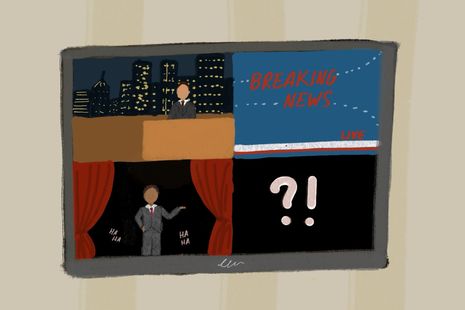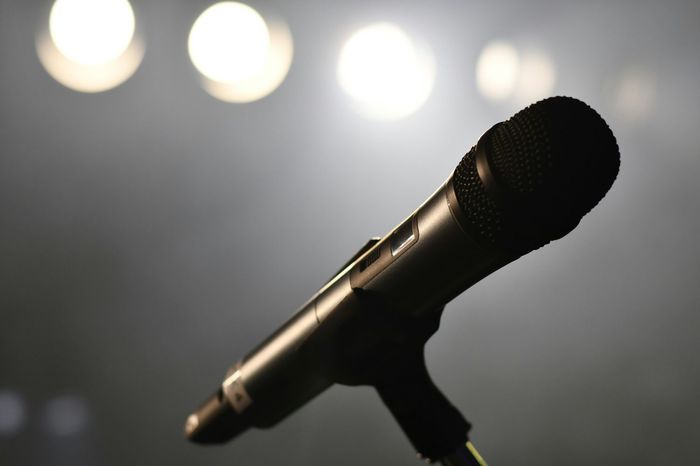The (in)effectiveness of modern satire
Oliver Kingston questions the role of satire in our current political landscape

“There are specific periods when satire is necessary. We’ve entered one of those times.”- John Doyle
Gen Z. We have become known, in part, as the generation that can make a joke out of anything. While gallows humour is nothing new, our love for ‘shitposting’ has expanded the Overton window and changed what we deem acceptable to laugh about. Now, absurdity, irony, and meta-humour thrive in the form of World War Three Fit Checks hand JD Vance memes. Within hours of Charlie Kirk’s death, TikTokers were lip-syncing to his ‘greatest hits’. This ironic approach to everything from politics to work has earned us the following monikers“most annoying”, “absolutely delusional”, and, to top it off, “the worst generation”. But, for a generation whose adolescence was upended by a global pandemic, whose twenties are being plagued by a recession, and whose future is clouded by the existential threat of climate change, laughter has felt like survival.
Nonetheless, to quote Bo Burnham’s Inside, “Should I be joking at a time like this?”
This is becoming an increasingly weighted question. Since younger generations, especially the now-teenaged Gen Alpha, have limited interactions with government, they tend “to understand platforms, the media, and even the entertainment industry as a single homogenous ruling order”. Couple this with a massive growth in what Phiddian calls the satirical-industrial complex, championed by late-night talk shows but seen more generally across popular comedy’s turn to the satirical, and you’ve got an entire generation of voters who primarily get their political news in the form of entertainment.
But can laughter be a political action?
While its popularity and long-standing history seems to be indicative of its political potential, we must not forget that satire has two primary purposes: “to critique and to entertain”. These objectives work against one another. Holm describes it as a bit like eating ice cream at a protest march against climate change. It’s something that feels ironic, or even inappropriate, because instead of being angry like we should, we feel satisfied.
After all, “if satire’s purpose was social change, we’re not picking a very effective avenue”.
While satirical figures like Stephen Colbert or Bo Burnham may be in the business of critique, most of their production resources are allocated not to political action, but to entertainment. There is a reason satirists are comedians, and very rarely politicians. Satire was never designed as the most efficient avenue for social change, and to expect it to be is to misunderstand its position in the entertainment business.
“Satire was never designed as the most efficient avenue for social change, and to expect it to be is to misunderstand its position in the entertainment business”
This is not to say that comedians are inherently politically ineffective or even politically damaging. Many comedians, Daniel Sloss or Romesh Ranganathan to name a few, use their platform to raise awareness and funding for charitable causes. However, satirical work in and of itself is not an effective vehicle for social change. This is why we see comedians like Dick Gregory who, in his growing commitment to civil rights politics, swapped stand-up for a hunger strikes. Bo Burnham again humorously debates this at the top of Inside: “Should I stop trying to be funny? Should I give away my money? No.”
While it would be foolish to expect satire to be as politically impactful as a hunger strike, it is still important to consider whether satire can be effective in keeping people engaged with politics, whether its need to be entertaining dilutes any political messaging, or worse, whether it can encourage an misinterpretation of its politics. After all, much to Margaret Atwood’s confusion, fans of The Handmaid’s Tale have begun dressing up as Handmaids at protests and for Halloween. She questions this: “Is it entertainment or a dire political prophecy? Can it be both?” This isn’t just pedantic philosophy either. I found this out when a relative asked me, straight-faced, whether watching The Handmaid’s Tale made me question getting the COVID-19 vaccine … while she drove me to my vaccination.
For younger generations specifically, the damage of a culture built on irony and cynicism is already being seen. For a majority of younger people, we felt as though we were handed a broken society that we could not fix, but one we also could not opt out of. Irony emerged as a coping mechanism against a demoralising reality and soon became culture – “everyone gets cancelled nowadays so I may as well like who I like” - and then became politics – “every party is corrupt so I might as well just not vote.” Irony has ushered in a culture of plausible deniability: “It was never going to work out in the end, was it?”
But “reactionary politics flourish most when it is difficult to imagine a better future.” Recent years have been a disastrous field test for the political efficacy of irony. From the 2017 Unite the Right Rally in Charlottesville to the most recent EDL Rally in London, we’ve witnessed what we can only call “watershed moments” for the racist trolls of 2016. In a time where debate now means spectacle on channels like Jubilee, far-right virtue signalling and dog-whistles are no longer relics of 4Chan message boards but have now become trends within mainstream meme-culture and shitposting. “Catchy aesthetics can transmit ideas that make you laugh first and radicalize later.” Sure, by the time it becomes ‘real’, most of the TikTok kids have called it quits. But “those that remained have become hardened ethno-nationalists who felt no need to cloak their message in irony.”
If irony and cynicism are the building blocks of right radicalisation, where does that leave satire as a genre to which both of those components are central?
And yet, to laugh at a time like this feels like survival. If anything, it is, at least, a sign of a mostly free press. A media that allows citizens to laugh at their oppressors is not wholly censored. Although, with the recent closure of Stephen Colbert in the US and the Palestine Action arrests in the UK, I’m unsure for how much longer this will be true.
But is that enough to justify satire in a time when political action itself, undiluted by humour, feels necessary?
Well, as silly as it sounds, as a trans person, if I had not seen people poke fun at JK Rowling’s mouldy wall, I might not be here. In the face of a future so bleak, satire is a way of knowing that, even when a government turns against you, you’re not the unreasonable ones.
“In the face of a future so bleak, satire is a way of knowing that, even when a government turns against you, you’re not the unreasonable ones”
In the end, we, as Nietzsche says, “have art in order to not die of the truth.”
While I wish I could say that I, and everyone else, should spend every second of every day out on the streets, we unfortunately do not have unlimited resources for sustained political action. Sure, in a world of instant communication, nobody can turn a blind eye to the horrors of the world or wash their hands of their own complicity. Yet, as satirical cartoonist Dan Perkins explains, “there are lots of things in this world you need to be outraged about, but outrage unchecked by laughter will eat you up inside. You need to laugh. That’s where we come in.”
So, when people ask, does satire just make us feel better? The answer just might be yes, and that may not be a terrible thing.
 News / Cambridge academics sign open letter criticising research funding changes22 February 2026
News / Cambridge academics sign open letter criticising research funding changes22 February 2026 News / University Council rescinds University Centre membership20 February 2026
News / University Council rescinds University Centre membership20 February 2026 News / Supporters protest potential vet school closure22 February 2026
News / Supporters protest potential vet school closure22 February 2026 News / Hundreds of Cambridge academics demand vote on fate of vet course20 February 2026
News / Hundreds of Cambridge academics demand vote on fate of vet course20 February 2026 Comment / A tongue-in-cheek petition for gowned exams at Cambridge 21 February 2026
Comment / A tongue-in-cheek petition for gowned exams at Cambridge 21 February 2026








